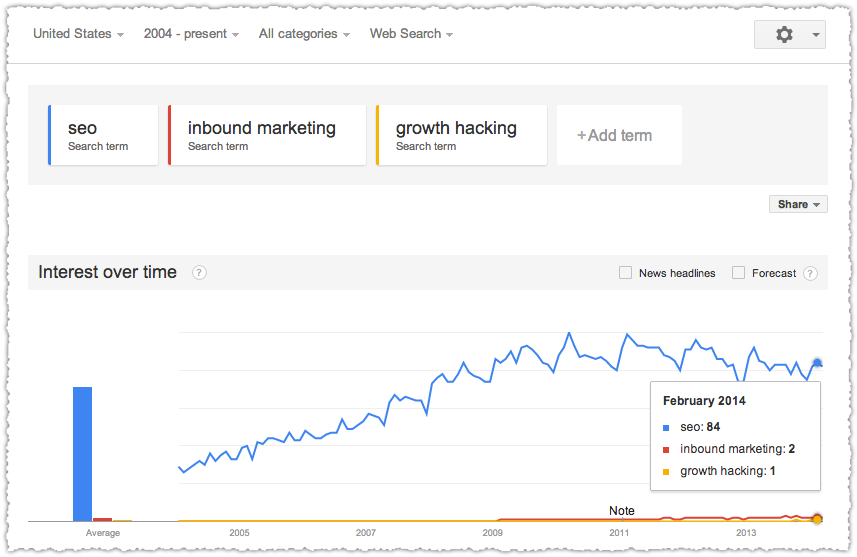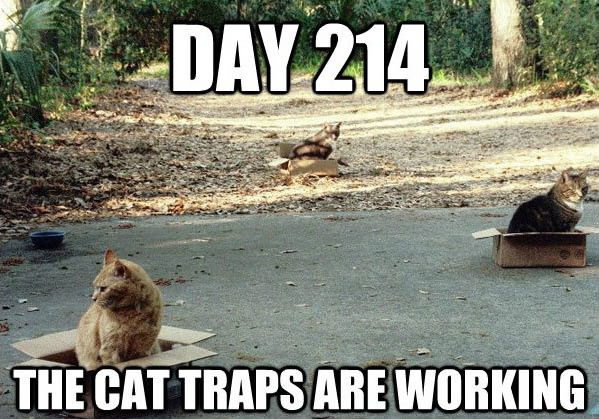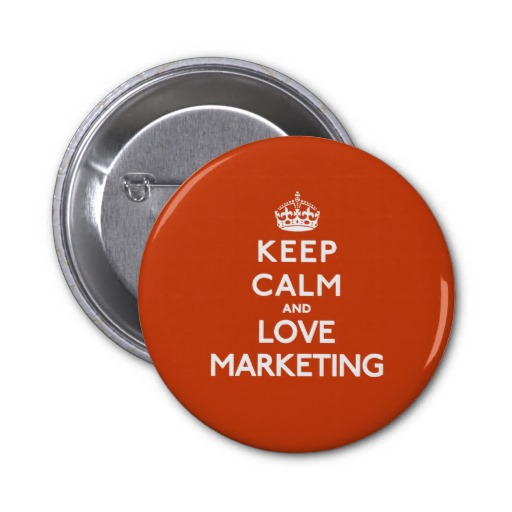Each year my wife and I take our daughter to the Chevron Family Theatre Festival at the Lesher Center for the Arts. It’s a great local tradition where kids sit on stage during fairy tale plays, get their face painted and eat ice cream among other things.
Last year we also saw The Pushcart Players, a smaller touring group, put on Stone Soup and Other Stories. They were excellent. Not only that but the Stone Soup fable they performed was new to me and, oddly, fit my view of SEO.
Stone Soup

The Stone Soup story is “an old folk story in which hungry strangers persuade local people of a town to give them food.” The scene opens with a traveller going through a Russian town way back when. In this instance the traveler is acquainted with the townspeople but it’s been a hard year. Everyone is hungry and they’re in no mood to share.
The traveller sets up his pot, puts water and a stone in it and gets a fire going, telling the passing townspeople that he’s making delicious Stone Soup. The townspeople are super curious (and hungry) so he promises to share the recipe if they help him make it.
He’s got them hooked! So as he’s stirring the traveller says “Well, you know what makes Stone Soup even better? Carrots.” And a townsperson runs off to fetch a carrot which is added to the soup.
Then the traveller says, “But, you know what else makes Stone Soup great? Onions.” And so another townsperson runs off to fetch an onion. The pattern continues with the traveller asking for a potato and finally a chicken until the Stone Soup is truly a delicious and hearty soup.
SEO is the stone.
SEO is Stone Soup

Watching and listening to the story I was struck that the way I approach SEO is just like Stone Soup.
A client might come to me for what many might think of as traditional SEO, including technical issues, keyword research, on-page optimization and (the dreaded) link building. But as I work with a client I take on the role of the traveller.
You know what would make your SEO even better? Some conversion rate optimization. Even more so? Focusing on user experience. Oh, and do you have an email marketing program? No? Oh, well that’s critical. You’re doing social right? How about remarketing? No! Well that’s a no-brainer. Have you looked at these business development opportunities? Can we talk about your product? And lets start promoting benefits instead of features, okay?
The list is pretty long and at the end of the day SEO is simply digital marketing.
Why Sell SEO?
If SEO is just digital marketing why do I continue to sell SEO? That’s how my clients talk about this problem! I’ve done my intent and user syntax research.

Honestly, I don’t really care what we call ourselves. All of the above terms are just fine and you might have found a way to use other terms to sell your services. Awesome! More power to you.
But in my experience, when people are looking for help with their business (aka more traffic) they often use the term ‘SEO’ as a proxy. So I want to be there when those clients come knocking.
In the end it doesn’t matter what was said about SEO on The Good Wife. It only matters how prospective clients talk about and express this intent. Because the intent behind those looking for SEO matches what I offer, whether they realize it or not.
Baggage

There’s a tremendous amount of angst around the ‘baggage’ that comes with the term SEO. People say that the mainstream thinks of us as spammers. That the term SEO is toxic.
Every objection is an opportunity.
That’s what I used to tell my employees when I ran telemarketing programs at George Washington University, American University and UCSD. One of my jobs was to arm my callers with answers to predictable objections.
Objection: “The university doesn’t need any more money. They get plenty from the state of California.”
Response: “Actually, the amount the university gets from the state has dropped from 80% to 20% in the last 10 years. We need your help more than ever.”
I’m not sure I have the facts right here but it’s something like this and you get the gist of it, right? When someone raises an objection it’s actually an opportunity to have a dialog.
Why not use that to your advantage?
Predictability

One of the other reasons I still use the term SEO is that the questions (or objections) I’m going to get are predictable. I can anticipate the questions and can have great answers to them ready to roll off my tongue or fingertips.
I’ve used this technique in many places. For instance, what do you think one of the most frequent questions is about Blind Five Year Old? The name! So I get to tell them about my philosophy of SEO right away. #winning
Back in the day, I left a gap in employment on my resume knowing that a good interviewer would ask me about that gap. I had a great answer lined up. And I’d rather talk about what I want to talk about rather than leave everything up to chance.
Same thing when you’re creating a pitch deck. Engineer the presentation so that you can anticipate the questions! I’m not saying look like an idiot. Just be smart and you’ll increase your odds of getting the questions you want to answer.
So with the term SEO I know a lot of the questions are going to be about spam, links and other dated techniques. I have my answers. Not only that but I can qualify clients by how they respond to my answers.
Marketing

In the end I approach things as a marketer. I’m using what is sometimes referred to as a bowling pin strategy. I’m following the user syntax of my clients and matching their intent.
I know the funnel is going to be dirty, chock full of the misinformed working off of 2007 rank-fast SEO tactics. But it’s a ginormous funnel that isn’t going anywhere anytime soon. So my job is to quickly find the diamonds in the rough.
Mind you, I no longer have to do a lot of this since nearly 100% of my business comes via referrals. But I got to this point using the strategy outlined here and hope I’d do it again (nearly) the same way if I were starting from scratch.
TL;DR
SEO as a profession is much larger than the specific acronym indicates. Yet, SEO remains a powerful term because of user behavior and intent, providing an opportunity to deliver other important digital marketing techniques to a larger audience. So I sell SEO as if I’m making Stone Soup.
The Next Post: The Ridiculous Power of Blog Commenting
The Previous Post: Knowledge Graph Optimization

5 trackbacks/pingbacks
Comments About SEO Is Stone Soup
// 21 comments so far.
Victor Pan // March 17th 2014
“Engineer the presentation so that you can anticipate the questions!”
I did that just the other day. Someone was asking me how I was pulling correlation data on keywords. Google trends + simple Excel formula. It was the only Appendix slide I kept in the deck because… I already knew the question was coming.
Great blog post as always AJ. Love the stone soup parallel and how you’re using SEO as a basis for your clients to embrace digital marketing.
AJ Kohn // March 17th 2014
Thanks Victor. You know, in many ways, anticipating the questions simply means you know your customer. That’s what it’s about at the end of the day.
I find the Stone Soup parallel amazingly helpful in describing how I work with clients. Amazing how something from one world can translate to another.
Paras // March 17th 2014
Such a great peace of information and smartly described the journey of digital marketing. Thanks for tremendous article.
Bobby // March 17th 2014
AJ this is an article to be proud of. Its great on so many levels. Between this article and the article you wrote on KGO, you are on a roll.
Mixing in a story.
Understanding your customer by leave room for the questions you want asked.
Understanding that SEO is just one cog in the Digital Marketing wheel.
Did I mention the story? Haha Great, great article.
AJ Kohn // March 17th 2014
THanks Bobby. I take a lot of pride in my writing so it’s nice to get feedback like this, particularly around the story.
Tony Dimmock // March 17th 2014
You’ve nailed the process I take with potential clients to the tee AJ!
I’ve also commented on MaxMinzer’s share of your post on G+, with some comments of my own. Wonderful post, delightful story and probably one of the few posts I’ve read in 2014 that really get’s it (and then some..). Thanks so much for sharing AJ 😉
AJ Kohn // March 17th 2014
No problem Tony and I’m sure you and Max will have a great show (client commitments prohibit me from being there).
The other missing ingredients that I didn’t go into were that you show value (hopefully some amount of success) and that you build trust. In the end, that’s a fair amount of what we sell. Trust that we know what we’re doing and can help them achieve their business goals.
Nick Ker // March 17th 2014
This is awesome. I also get a lot of people coming to me from 2007-ish for SEO, or maybe penalty help, saying “just SEO, none of that fancy content/inbound stuff” and it happens…”y’know, we should really work on making your social presence more legit while we wait for a reply to that reconsideration request. Trust me, it is ‘good for SEO’…”
AJ Kohn // March 17th 2014
Thanks Nick. And you just described Stone Soup! As the water and rock boil you offer up a few other ways to make it better. Perfect.
Gael Breton // March 18th 2014
I think one thing we often forget as marketers working in this industry every day is that it takes time for the information and changes to reach the general public. For most people, Panda, penguin etc are all brand new. But they’re really over 1 year old now.
If you look at search volumes for keywords such as “directory submission” “blog network link building” etc, you will see the searches don’t really decrease that much.
Anyway I like the approach of leaving gaps in your communication to elicit the questions that will make you score points. I’d love to see a post with a longer list of these.
Gael
AJ Kohn // March 18th 2014
Gael,
Very true. In fact, the majority of people don’t have nearly the level of knowledge that we in the industry have nor what we assume others to have. There’s a famous video where they find people on the street and ask them the difference between a search engine and a web browser. Most had no clue.
Regarding the communication gaps. It’s an interesting strategy which can backfire if you’re gaps are too big. But done right it’s powerful. I had an up close look at this as an account coordinator at an advertising agency – my first job after college. He got people to ask the questions he wanted and to lead them down the path to the decisions he wanted them to make.
Alexandra Nicola // March 18th 2014
I find the comparison accurate. I want to do better on the internet what should I focus on ? “SEO” comes the answer but the through is that you need a coherent, unified and personalized digital strategy to get the best results. But SEO is faster.
Holly DeWolf // March 18th 2014
Oh, I am so glad that I ran into this post! I’m a UX consultant and I’ve been struggling with explaining to my clients the difference between UI design and user experience research and strategy. Someone had suggested I “sell them what they want first”…this stone soup metaphor has really brought it home for me.
“Oh, you need someone to make your app look pretty? Well, while we’re at it, we should take a closer look at your Information Architecture. You’re not sure if that feature is even worth working on? Well, let’s do some research to find out.”
Thanks! I’ll be adding you to my RSS reader.
AJ Kohn // March 18th 2014
Exactly Holly! You can use this in any field where there’s information asymmetry – meaning you have a lot more knowledge than your customers.
So get in the door with the thing they think they want and show them they need that as well as these other things if they want to reach their goals.
Gene Maryushenko // March 18th 2014
Great analogy, couldn’t have said it better myself. I love the way you explain SEO as an anchor to all marketing ingredients. I see people trying to distance themselves from the term, making up new names and titles for themselves, somehow convincing themselves that it’ll make any difference. In the end, it’s all about fitting the puzzle pieces for a wholesome approach to solving the problem at hand.
AJ Kohn // March 18th 2014
Thanks Gene and I agree. SEO is a fine term – in fact the most dominant term – so it’s about leveraging it and making it do the things you want.
It takes a lot of time and effort to brand a whole new term and while I understand why some are trying to do that, it’s like building a sand castle on a very windy day. You’ll make slow progress and you’ll get a lot of sand in your eyes in the process.
Takeshi Young // March 18th 2014
Love the cat meme, reposted on Google+:
https://plus.google.com/+TakeshiYoung/posts/aw4NdGAr1Cg
Dawn Anderson // April 17th 2014
Totally agree, SEO is just a phrase that clients use when they mean “I want more business via the web”. It’s our job to educate them that there are so many other channels which work together online with a site at the centre.
AJ Kohn // April 17th 2014
Exactly Dawn. Thanks for the comment.
Nic Cliche // April 17th 2014
Wow, thanks. Really great advice for me. I feel I have one more way of winning more pitch 🙂
and love the Cat Meme!
Andrew Broadbent // October 08th 2014
HI AJ,
This is a another nice read. Thank you for that hangout we had last month, I took the job in NYC and it has been interesting so far. I have question that is slightly off topic from this wonderful blog post. Do you have any clients, where their website has more than one language? How do you deal with duplicate content issues, when the clients are using translator plugins in WP for every page?
Sorry, comments for this entry are closed at this time.
You can follow any responses to this entry via its RSS comments feed.